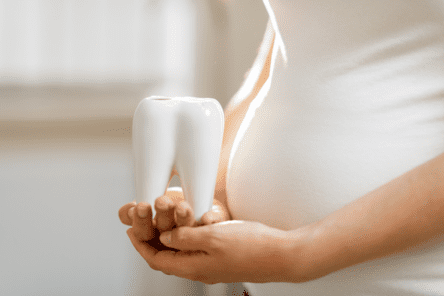Oral Health and Pregnancy
When we talk about oral health during pregnancy, there are many facets to consider. The oral health of a mother can have an impact on the pregnancy and the developing baby’s health. The pregnancy can also disrupt and change a mother’s oral health as well. Oral health being linked to overall health is significantly highlighted when you look at the relationship between mother, baby and the mouth.

How Your Oral Health Affects Your Baby
A mom’s oral health is connected to the health of her unborn baby through the bacteria in her mouth. Research has found a link between severe gum disease in pregnant women and premature birth with low birth weight. Babies who are born prematurely can have a risk of brain injury and problems with their eyesight and hearing.
It’s been determined that up to 18 out of every 100 premature births could be linked to severe gum infection. Gum disease can be treated by a dentist during pregnancy, so be sure to visit your dentist if you require treatment and support for your oral health.
A mother’s oral health can affect her baby in the following ways:
- When a pregnant woman has excessive bacteria growth in her mouth, it can enter the bloodstream through her gums and travel to the uterus which triggers the production of chemicals called prostaglandins, suspected to induce premature labour.
- After the baby arrives, the mother can potentially pass her bacteria on to her newborn through “spoon”l transmission. This means a mom who has lots of acid-loving bacteria in her mouth will pass higher numbers of those bacteria to her newborn.
How Your Pregnancy May Affect Your Oral Health
It’s common for a future mother’s teeth and gum health to decline during pregnancy. To help you understand how, here are a few things that can cause problems:
- Pregnant women are often exhausted by the end of the day. As a result, nighttime brushing and flossing routines may get skipped, as well as regular dental visits. This can lead to plaque and bacteria build-up and eventually tooth decay.
- Hormonal changes during pregnancy can affect the health of your gums and can cause pregnancy gingivitis, including bleeding gums. Untreated gingivitis can lead to periodontitis – a more serious form of gum disease that includes bone loss. Research also suggests a link between preterm delivery, low birthweight babies and gingivitis.
- Morning sickness can do a number on the mouth. Stomach acid makes its way into the mouth and can weaken tooth enamel which puts expectant moms at a greater risk for cavities.
- Eating more often during pregnancy is common, but frequent snacking and grazing puts teeth in constant contact with acid in food. This also leads to increased production of acid-loving bacteria which produce even more acid to weaken enamel.
- Pregnant moms need to take a prenatal vitamin that contains folic acid to support their babies’ health during pregnancy. Chewy or gummy vitamins can pose dental concerns, especially if you are eating them after brushing teeth or before bed. They stick on the teeth and most contain sugar that can damage teeth.
If you are trying to conceive, now is a good time to visit the dentist and clear up any outstanding oral health concerns. You should also establish good oral hygiene habits now to ensure a healthier mouth during pregnancy including:
- Brushing your teeth at least twice a day with fluoride toothpaste.
- Flossing between your teeth daily.
- Eating a healthy diet and limiting food and drinks high in added sugar.
- Avoiding tobacco products and minimizing alcohol.
- Visiting your dentist at least twice a year.
If you are already pregnant, your dentist can guide you through ensuring your mouth is healthy and keeping it that way throughout your pregnancy. If you need dental treatment during pregnancy, non-urgent procedures can often be performed after the first trimester.
Book an appointment today for a Comprehensive Evaluation to ensure your mouth is in the best shape possible as you are creating a new life!
